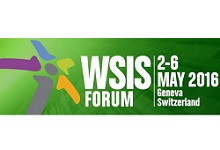WSIS Forum 2016 – Moderated high-level policy session 03.05
3 May 2016 12:00h
[Read more session reports and live updates from the WSIS Forum 2016]
The High-Level Track Facilitator for Session Two, Dr Shailaja Fennell (Lecturer in Development Studies, Centre of Development Studies and Department of Land Economy, University of Cambridge, United Kingdom), opened the session on Knowledge, Capacity Building and E-Learning by stating the importance of representative organisations for capacity building and awareness raising. Participants then mentioned the various domains that would benefit from the advances of ICTs, such as education, the connection of rural and remote zones within states, the wellbeing of populations, economic and social development, justice, equality, and social inclusion. Some mentioned the risks brought about by ICTs, such as espionage and conflict on Internet platforms, risks that need to be addressed with cooperation on the part of all states. Public-private partnerships and South-North cooperation were seen as central necessities in knowledge building in order to bridge disparities in expertise and resources, especially in developing countries. Finally, Mr Andris Vilks (Director, National Library Latvia) stressed the importance of providing universal access to the Internet and to information.
Mr Klaus Stoll (Executive Director, Global Knowledge Partnership, Germany), High-Level Track Facilitator, opened the session on Inclusiveness – Access to Information and Knowledge for All (Session Four) by emphasising the role of ICTs in achieving the sustainable development goals (SDGs). The representative of Algeria, H.E. Ms Houda Imane Faraoun (Ministère Algérien de la Poste et TIC) then explained the contribution of the Internet to economic growth and development in Algeria, while insisting on the need to introduce amendments to the current regulations, in order to guarantee more democracy through better transparency and the restructuring of cyberspace. The notion of inclusion was then discussed by H.E. Mrs Tarana Halim (State Minister, Ministry of Posts, Telecommunications and Information Technology, Bangladesh) who explained that multiple telecommunication infrastructures are part of the country’s development plan. They take into account education, health, and agriculture, among others. The idea of tackling the challenges to achieve access was also highlighted by H.E. Mr Emilio Arias (Deputy Minister of Telecommunications, Costa Rica).
Inclusiveness was also stressed in Session Six as a means of eliminating poverty and marginalisation in all forms, through the creation of jobs, and the democratisation of access to the Internet in all areas of national territories. The promotion of ICTs through awareness raising was also mentioned as a means of bridging the gender gap, specifically by Ms Iffat Gill (Head of The Code To Change) who noted that including men in fighting the gender gap would be profitable to society as a whole, especially economically. H.E. Prof. Irini Reljin (Assistant Minister, Ministry of Trade, Tourism and Telecommunications, Serbia) also debated inclusion of another group: people with cognitive learning and mobility disabilities. Finally, Dr Heide Hackmann (International Council for Science) discussed the need for open access to data, to ensure scientific rigor and knowledge as a public open good, with targeted support for developing countries.
Finally, Session Eight on ICT Applications and Services allowed participants to explore how ICT applications could help reach the SDGs. The functions of a framework for exchange and mutual cooperation to facilitate joint development were stressed, as well as the need to adapt them to specific needs. H.E. Ambassador Mrs Filloreta Kodra (Ambassador, Permanent Representative of Albania to UNOG) explained the three main directions of the Albanian government’s effort (adding and promoting electronic services, using ICT for the purpose of education and to empower the youth, and consolidating digital integration in the whole territory by respecting the European principle of free and honest competition). She showed how ICT applications and services can provide a framework to act in, in order to transcend the digital gap. The role of small and medium enterprises (SMEs) was also stressed by many participants, along with the necessity of helping them use ICT to generate income through developing digital economy strategies. Finally, the environmental impacts of ICT applications and services were noted, with the example given by Mr Justin Keeble (Accenture) of a potential 20% reduction of global carbon emissions by 2030.
by Laetitia Honsberger
Related event

